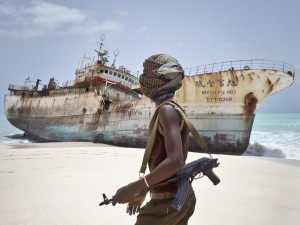Special to WorldTribune.com
WASHINGTON — Somali-based piracy has continued its decline.
The United States and European Union have reported a drop in piracy operations both in the Red Sea and Arabian Sea in 2013.

Officials said pirates, who still hold 49 hostages, failed to hijack any vessel off
the coast of Somalia since May 2012.
“This is the lowest rate of attempted hijackings in over six years, and certainly since the peak of the crisis in 2011,” State Department counter-piracy coordinator Donna Hopkins said. “No ships are currently held hostage by Somali pirates, although there remain at least 49 hostages whom the international community are working to free.”
In a briefing on Feb. 20, officials attributed the decline in piracy to both Western-led naval operations as well as improved security by merchant ships. They said 1,430 suspected pirates were being prosecuted in 21 countries.
“The remarkable drop in piracy is due primarily to two things,” Ms. Hopkins said, “first, proactive counter-piracy operations by the many national navies and missions that are preventing and disrupting pirate attacks off the coast of Somalia and in the eastern Indian Ocean, and better self-protection by commercial ships, including the use of embarked armed security teams.”
Officials said the EU, in cooperation with China, Egypt, Russia and
Turkey, has taken the lead against Somali-based pirates, financed in part
from the Gulf as well as the Somali community in the United States. They
said the EU naval task force has deployed up to seven surface vessels to
monitor suspected pirates as well as foil attacks.
“We have changed with the time and the rotations, but usually an average
four to seven warships in the region plus some two or three maritime patrol
reconnaissance aircraft,” EU delegation deputy chief Francois Rivasseau
said.
Rivasseau said, however, that piracy could quickly return to the Middle
East and surrounding region. He said pirates were monitoring the level and
effectiveness of Western naval operations.
“It is not because we have had such a diminution of attacks that we know
that the risk has disappeared,” Rivasseau said. “We see a number of
suspicious approaches; we see still a number of attacks which we have been
able to deter. And if it’s resurged, then after that it will require higher
level of efforts to re-curb it again.”

You must be logged in to post a comment Login